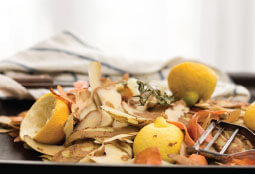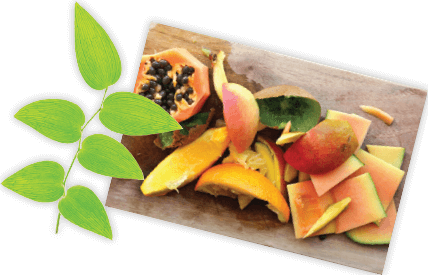Commercial Services
EDCO’s New Organics Recycling Program Collects Food Scraps and Landscape Waste Mixed Together in a Green Organics Container
Folleto de Productos Orgánicos Comerciales que Viene Pronto
Bilingual Commercial Organics Guide
Commercial Edible Food Recovery- Senate Bill 1383 – Tier 1 and Tier 2 Generators
| Recyclable Organics Includes | |
|
|
Place recyclable organics directly into your designated green collection container. Do not use any kind of plastic bags (including certified compostable or biodegradable bags) for any type of green waste, food waste, or other organics collection or disposal, as they contaminate the material! All organic material must be placed loosely inside the green container for collection. Paper bags are acceptable.
Please do not place any of the following materials in your designated green organics recycling container:
- No plastic bags.
- No trash or hazardous waste.
- No animal waste.
- No dirt, rocks, asphalt, concrete, sand, etc.
- No treated or lead-based painted wood or lumber.
Organic Waste

Organic waste is a renewable natural resource, and it mainly comes from yard and kitchen waste from homes, food waste, and industrial and commercial operations scraps. Mandatory recycling of organic waste is the next step to achieving California’s Zero Waste goals.
Recycling organics is easy and convenient with EDCO’s commingled Organics Recycling program. EDCO has expanded its source-separated green waste collection to include recycling food waste. The service will allow customers to place food scraps in the same container as green waste. EDCO’s new Organics Recycling program is a foundation for your community to achieve state mandates, including AB 1826, AB 1594, and SB 1383, which are directly related to organics recycling in California.
EDCO’s Commercial Food Waste Recycling Video
Please watch our informative video to learn more about EDCO’s new Organics Recycling Program and how it will significantly impact the future of organic waste.
Why Recycle Food Waste?

Organic waste accounts for over 40% of California’s waste stream material. Organic material cannot break down when buried in a landfill, as it would in nature or a compost pile, because it decomposes without oxygen, releasing methane gas into the atmosphere.
Organic waste is recycled into valuable compost or mulch used in an organics recycling program for soil restoration. It can also be recycled by anaerobic digestion, producing nutrient-rich biofertilizer, renewable energy, and fuel. By recycling food waste, you extend valuable landfill space, which also reduces CO2 emissions and preserves our environment!

What Will Go in the Green Cart
Below are just a few examples of what can be placed in your green organics cart.

Food Scraps
Fruit, vegetables, meat, bones, dairy, eggshells, prepared food

Food-Soiled Paper
Napkins, tea bags, paper plates, coffee filters

Yard Waste
Plants, leaves, branches, grass


What Can You Do Now?
In the United States alone, a shocking 40% of food is uneaten, wasted, and discarded. We, as consumers, are the largest producers of food waste, believe it or not, exceeding grocery stores and restaurants combined! So, the smallest changes add up and make a huge difference. San Diego Food System Alliance is leading an initiative across San Diego County to reduce food waste and increase food donations to people. By visiting their website, at sdfsa.org, customers can find information on food recovery throughout the county, food donation guides, and resources.
Please visit our Resource Center for additional information, including informative videos, recycling guides, and service brochures.
Free Mulch Available
Free mulch is available at Ramona Disposal.
This is a self-serve, self-loading and self-haul service, so bring your own cans/bags, gloves and shovel. If you plan to haul your mulch in an open truck or trailer, please bring a tarp to cover your material.
Important: You must provide the scale operator with the address where the mulch will be applied.
Ramona Disposal is located at 324 Maple Street, Ramona, CA 92065.
Mulch pickup hours:
Monday – Saturday, 7:00 a.m. – 4:30 p.m.
Closed: Sunday
Open all holidays except Thanksgiving Day, Christmas Day and New Year’s Day.
Your Service Area
You are currently viewing services for Lakeside. Enter a zip code to if you want to switch to another location.